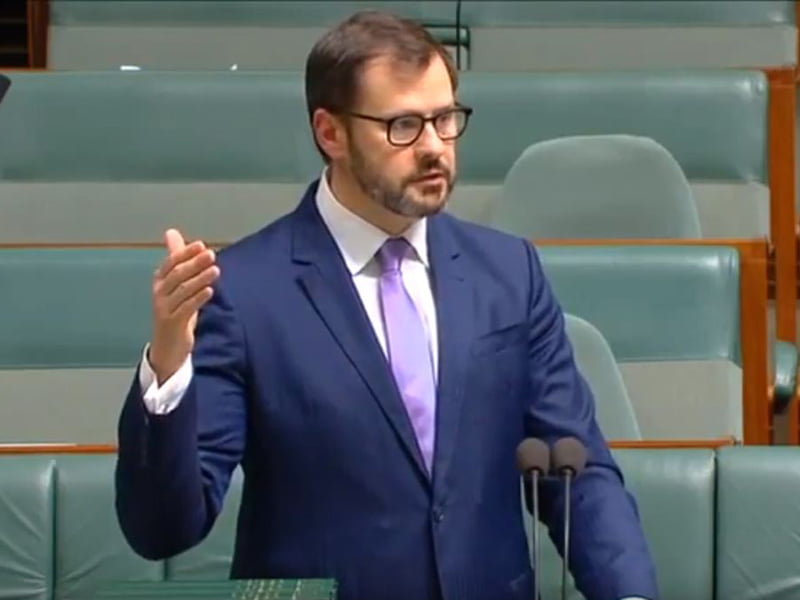The Australian government quietly passed the Copyright Amendment (Service Providers) Bill 2017 on Wednesday, but it did not go through without scrutiny altogether.
Shadow minister of the digital economy Ed Husic criticised Communications Minister Mitch Fifield for not extending safe harbour protections to include startups and tech firms under the amendments.
“We’ve got to be pro smart firms that are providing opportunities for others to create an income,” Mr Husic told the Parliament.

“But, because the communications minister did not have the wit, the wherewithal or the courage in this debate to come up with an alternative way to extend safe harbour protections for great Australian firms, that’s what we’re missing out on.
Government introduced the Bill in early December to extend the copyright safe harbour scheme to educational institutions, libraries, organisations assisting persons with disability, and key cultural institutions.
But it decided against including online platforms hosting user-generated content under the scheme, as well as tech companies and startups that have been lobbying for the reform for years.
Extending safe harbour protections to online content platforms had been recommended by a number of independent organisations, from advocacy group StartupAus to the Productivity Commission.
Redbubble founder and soon-to-be retired chief executive Martin Hosking took aim at the government over the decision, calling it a “clearly missed opportunity.”
“We’re left with a situation where Australia is the only country in the OECD that doesn’t have intellectual property laws that deal with the reality of the internet,” Mr Hosking told InnovationAus.com.
“We’re left with a situation where the politicians seem to have accepted that user-generated content on the internet – which is the foundation of most of the modern internet – is not dealt with under copyright legislation,” he said.
“The threat to Australian companies is real. The threat to innovation in Australia and to the lack of potential for us to have modern IP laws is real.
“It’s simply remarkable to me that a country like Australia where politicians who say they support innovation cannot get their own house in order and support basic innovation to protect Australian companies, and ensure they have a level playing field with international competitors,” mR hOSKING SAID.
“The reason why [the bill] has passed is to do with a lack of politically foresight and coverage.”
RedBubble is facing a number of lawsuits in Australia over copyright infringing content posted by users on its platform.
However, if the safe harbour scheme was extended to online service providers, the company would have been protected from these legal actions.
Ed Husic said “there are some great firms here that are doing some important work in generating new income, be it for artists, manufacturers, printers or the like.
“They have no sense of comfort as a result of what the government has put forward today that they’ll be looked after and that they will avoid the spectre of legal action against them,” he said.
Redbubble had previously threatened to move overseas if the safe harbour regime was not extended. While Mr Hosking will be finishing up with the company, he has advised that while nothing is immediate, the company’s board should “consider the implications.”
“Australia is a small market for; it’s less than 7 per cent of our sale. Most innovative companies would have a similar profile. We don’t have to remain in Australia, but we choose to do so,” said Mr Hosking.
“When you undermine innovation and the potential global company, they will seriously look at where they’re located. If you’re a venture capital firm and you want to invest in a company that has user-generated content anywhere as part of their profile… then you would prudently have that company relocated outside of Australia.”
The government was close to extending the safe harbour scheme to user-generated online content platforms earlier in the year, but withdrew after facing intense lobbying from content owners, including the Australian Recording Industry Association, Foxtel, the AFL and News Corp.
According to Mr Husic, the solution would be to find a “sensible middle ground that doesn’t just protect artists’ income but gives them an opportunity to grow, so that they’re not just reliant on grant schemes administered by government to survive but can find new avenues for income growth.”
“Out of $100 million, 10 per cent is generated by Australian artists, with a growth rate of 50 per cent per year. That’s huge. We have to not only protect Australian artists and find new incomes for them but also, if we are serious about promoting Australian innovation, provide an area with room to move for these firms to grow,” he said.
Mr Hosking agreed the innovation sector lost push for safe harbour protection because it makes up a relatively small part of the national economy.
“We’ll lose the debate while we remain small, and we remain small because we lose the debate. We need to break that nexus but that requires some political code,” he said.
Do you know more? Contact James Riley via Email.

